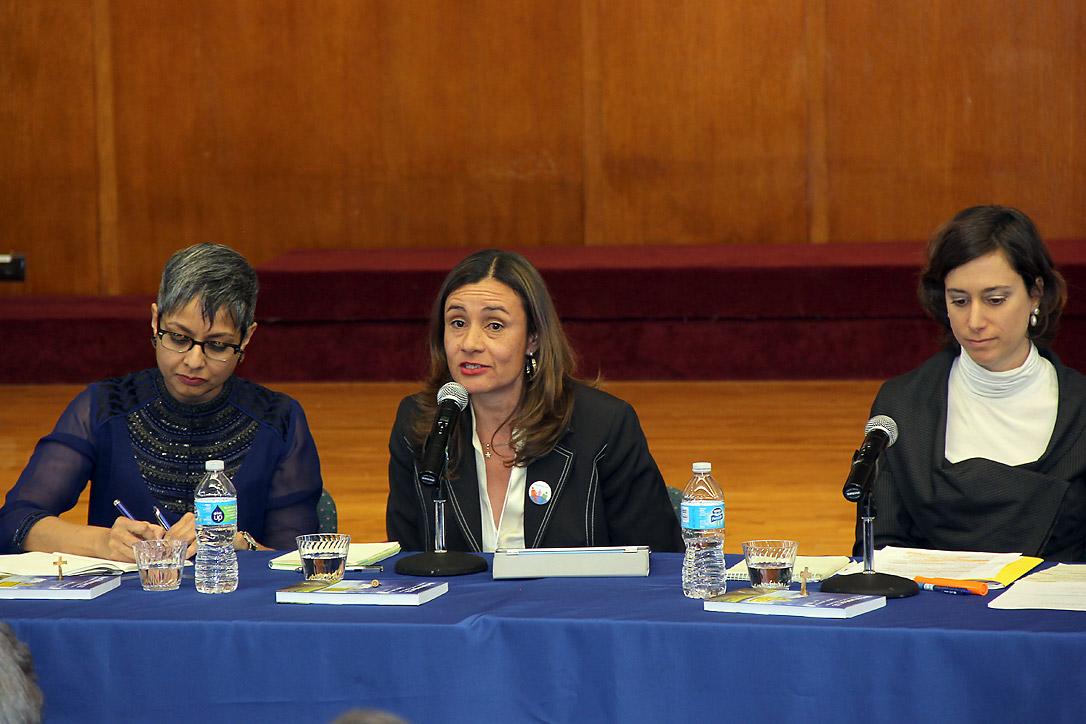A strong commitment to ‘leave no one behind’

LWFâs Maria Cristina Rendón (center) called for strong commitment by faith-based organizations to eradicate global poverty. Rendón, moderating a panel on
(LWI) – As the United Nations Commission on the Status of Women (CSW) begins its 60th session in New York this week, representatives of faith-based organizations including The Lutheran World Federation are advocating for greater effort to reduce gender inequality.
The current session of the commission meets under the theme “Women’s empowerment and sustainable development.” The UN underlines gender equality as a critical factor in achieving global targets for sustainable development agreed by world leaders in September 2015.
At a side event organized by the Ecumenical Women’s platform, Rev. Cibele Kuss, executive director of the Lutheran Foundation of Diakonia discussed how a feminist faith discourse can help to achieve gender equality. She noted that throughout history, a predominantly male religious elite has influenced and shaped traditional interpretation of Holy Scripture. She argued for a “democratic reading” of the Bible that includes the voice of all people, integrating the perspectives of both men and women.
Kuss is among a six-person Lutheran communion delegation at the CSW session, bringing faith perspectives from the different world regions. Lutheran Foundation of Diakonia, which is the diaconal arm of the Evangelical Church of the Lutheran Confession in Brazil, works with over 60 local networks addressing domestic and social violence, indigenous rights and food insecurity throughout the country.
Leave no one behind
In her presentation, Kuss, a member of the LWF Council, stressed that one of the current struggles for feminist theologians in Brazil and other countries in Latin America is the religious power that “dominates our [women’s] bodies.” Women are increasingly excluded from participation and decision-making within faith-based organizations, she remarked.
She called for a new faith discourse on the concept of God and power that includes all perspectives and voices, especially those of women who are “left behind.” She said the LWF Gender Justice Policy and a parallel one produced by the Lutheran Foundation of Diakonia provide concrete strategies to address structural issues on access to decision-making and inclusion.
Other speakers at the event included Nyaradzayi Gumbonzvanda, general secretary of the World Young Women’s Christian Association. She noted that often, faith institutions play a negative role with regard to women’s rights, and urged efforts to reduce gender inequalities.
Maria Cristina Rendón, LWF program assistant for Women in Church and Society, urged faith-based organizations to respond with strong commitment to the 2030 agenda of eradicating poverty and “leave no one behind.” She noted that despite a global increase in the number of educated women and economic development, gender inequality was on the rise and women continue to occupy poor quality jobs.
Rendón reiterated the crucial role of faith organizations by highlighting the LWF, ACT Alliance and World Council of Churches joint statement to the CSW: “As a faith-based alliance, we acknowledge that religious conviction can be harnessed as a positive force for transformational change and we celebrate the contribution toward gender equality made by the faith sector.”
The LWF is part of a coalition of 18 church congregations and ecumenical organizations accredited with the UN. The 60th CSW will conclude on 24 March.
Nicholas Jaech, program associate at the Lutheran Office for World Community contributed this story.





